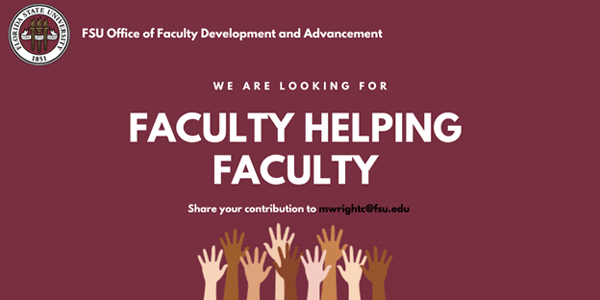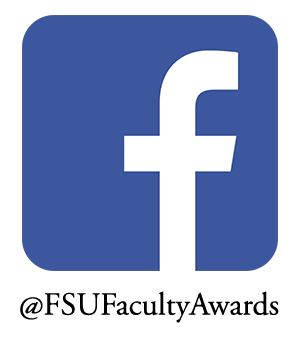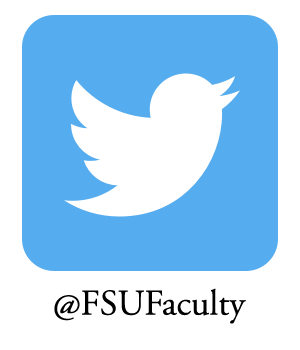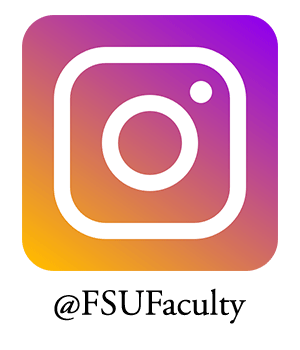A Word From the VP
Dear Colleagues,
Almost six months ago to the day, we were returning from Spring Break 2020 to a very different campus (no students!) and a very different way of life. I continue to be impressed with how well our faculty rose to the challenge of converting courses to online delivery. Chances are FSU will need to offer many of our classes online for the rest of this academic year. Fortunately, through your hard work and taking advantage of the services provided by ODL and CAT, our students continue to receive a high-quality education. Thanks for all you do for our students and the university.
Due to the pandemic, we are all experiencing the "opportunity" to do things differently. My office had the "opportunity" to do New Faculty Orientation online this year. Starting off at a new university is hard in the best of times; I can only imagine how difficult it is to join the faculty in the time of COVID. I confess to missing the social events and getting to know not just our newest colleagues but also their families. We owe them a party – and I will make good on that commitment just as soon as it is safe to do so – but until then we are extending NFO through the year (virtually, of course) to help our new colleagues learn about the university and each other. I hope that you will find ways to connect with the new faculty as well. Check out your newest colleagues in the New Faculty Directory (in this issue), complete with short videos the new faculty created to introduce us to their work and tell us why they chose to begin or continue their academic careers at FSU.
Working from home and keeping our distance from others may be easier for those of us who are not new to town and not in their first year on the faculty, but it is still hard. For most of us, being around our colleagues is one of the best things about being at FSU. In fact, the top response faculty give to the question about what they like most about FSU is: "my colleagues". This issue of the newsletter offers some ideas about ways to create and sustain academic communities albeit at a distance. Consider joining one of our faculty groups this semester.
Finally, this issue includes a section of "Faculty Helping Faculty" to recognize and thank faculty who generously offered their time and assistance to colleagues as we all confronted the challenges to faculty life brought on by the pandemic. If you’ve benefitted from a colleague’s offering, please let us know so that we can include them in our list.
I hope that you and your loved ones stay safe and healthy. If there’s anything I or my office can do to be of assistance, please contact us at fda@fsu.edu.
Best,

Janet Kistner
Professor of Psychology
Vice President for Faculty Development and Advancement
Faculty Support
New Faculty Development Deep Dive
FDA is excited to be hosting a year-long course for faculty new to FSU and the profession. Housed in Canvas, this course provides access to a great list of resources, offers space for practice and reflection in a community of peers, and meets synchronously once per month as a learning community. Led by Peggy Wright-Cleveland (Office of Faculty Development and Advancement) and Rachel Goff-Albritton (Office of Proposal Development), this deep dive will introduce faculty to the best of what the National Council for Faculty Development & Diversity (NCFDD) has to offer, FSU's ongoing commitment to equity, diversity, and inclusion, and to local history.
If you have not already been enrolled in the course but would like to participate, email Peggy Wright-Cleveland.
Community Writing Continues
It was easy to move FSU's faculty writing experiences online this spring. Amidst all the other changes and uncertainties, FSU faculty colleagues still met to support each other and focus on their writing. Throughout spring and summer, Assistant, Associate, and Full Professors from College of Social Work, College of Education, College of Nursing, College of Music; College of Arts and Sciences; College of Communication and Information; specialized faculty from Centers and working in administration; faculty residing for the moment in Tallahassee, Maine, North Carolina, Georgia, and New York gathered to move through their writing projects together. Faculty worked on IRBs, lit reviews, conclusions, methods sections – if it applied to research and telling the story of that research, they worked on it in our writing groups.
Zoom writing groups work like this: we gather with video and sound to greet each other and share our writing goals for the session, then we turn off our video and sound and write. Before we leave the meeting we record in the chat what we have accomplished. If you join late, you simply offer your greeting and goals in the chat.
If you would like to have a weekly reminder sent to you every Monday morning, email Peggy Wright-Cleveland. No registration required, though accountability – reporting your intent to attend or your need to miss a session – is welcomed. Join as you are able one or more of the sessions linked below. We will meet on this schedule all semester.
Zoom Writing Sessions for Fall:
Mondays, 12:30 – 5:00pm: Zoom link
Tuesday, 12:30 – 5:00pm: Zoom link
Wednesday, 8:30am – noon: Zoom link
Thursday, 8:30 – noon: Zoom link
Accountability and More
Sometimes things work even better than you imagined.
In 2018, four faculty members met for the first time in what was then called Black Dog on the Square. Their purpose was to form an accountability group, to practice supporting and holding each other accountable for the weekly professional goals they set for themselves. They agreed to meet every two weeks. They articulated specific goals for those two weeks and a scribe sent that list to everyone via email. These faculty members had not met before; they were not in the same department or discipline; they were at different stages of career – one in her first year; one in year six; one new to FSU but not to the profession. Still, they met every other week, practicing accountability, for the entire year.
In 2019, the group reconvened, one member left, and a full professor joined in. One of the original members was awarded promotion and tenure. Another bought a house, made a presentation in Prague and would have made one in Australia had COVID-19 not arrived. Another managed a tricky teaching situation and a mis-scheduled tenure review meeting, as well as took leadership at a national meeting. The full professor used her sabbatical to both publish and plan. And they kept meeting every other week, practicing accountability, for the entire year.
Now in 2020 this group is meeting via Zoom. They checked in on each other through the end of spring and over the summer and they are once again committed to meeting every other week, sharing their successes and challenges, committing to goals, and listening. I have no doubt that they will practice this accountability for the entire year.
If this sounds like something you would like to be a part of, email Peggy Wright-Cleveland. She can help you build just such a group.
Faculty Helping Faculty
Though not a new behavior, when COVID-19 protocols demanded faculty pivot to online teaching, FSU faculty who were experienced online teachers rose to the occasion and offered clear and accessible ways for others to be successful leading an online learning experience. Soon, researchers whose work was particularly complicated or even halted by COVID protocols began to work together to find safe ways to continue or return to that work.
Again, when American citizens began responding vocally to the death of George Floyd, FSU faculty responded and offered ways for each of us to more productively engage with each other.
The College of Social Science and Public Policy hosts college affinity groups that will now, at faculty request, include groups focused on Caregivers and White Allyship (see article below). In these affinity groups, faculty help each other through ongoing community, resource sharing, and sometimes policy change.
FDA will be highlighting instances of faculty helping faculty on our website. If you have made such an offering to your colleagues or benefitted from someone else's offering, please let us know so that we can include them in our list. We will do our best to keep this valuable work easily accessible to all who visit our website.
Here's a Sample of Faculty-Helping-Faculty from FSU's College of Education:
Know you need to rethink how to teach via Zoom? Check out this FSU College of Education Blog post
Though aimed at our broad American community, all suggestions here will help facilitate productive discussions with your faculty peers and your FSU students: Resources to Support African American Students
Thanks for all of your leadership, College of Education!
Faculty Development at COSSPP Sets the Bar High
This year, the College of Social Sciences and Public Policy provided their new faculty with a 64-page Welcome book. Too much, you think? Not so fast. Included was information on city events, local parks, area parks, museums, area schools, Gulf Winds Track Club, the Dean's Office favorite local restaurants, and COSSPP faculty favorite regional activities. Of course there was information on the College, including the Wicked Problems, Wicked Solutions blog, and information on NCFDD and CAT. In addition to sharing University Affinity Groups Information, the COSSPP Welcome Guide also introduced the College Affinity Groups. These groups are led by faculty, supported by administration with lunch, and meet throughout the academic year to offer specific support and camaraderie. The COSSPP Affinity Groups include:
- Assistant Professor Network
- Associate Professor Network
- Full Professor Network
- Faculty of Color Network
- LGBTQ+ Faculty Network
- Women Faculty Network
- Women Faculty and Grad Student Network (run by graduate students).
At faculty request, this year two new groups will form, one focused on Caregivers and the other focused on Allyship.
The goal of Faculty Career Development at the institutional level, the College level, and the Department level is the same: to facilitate long-term faculty career growth by developing community, offering mentorship, and supporting research and service. Thank you COSSPP for modeling such a substantial College faculty development plan and thank you Associate Dean Rohlinger and Dean Chapin for making this support happen every day.
If you would like to institute new faculty development ideas in your college or department, contact Peggy Wright-Cleveland for consultation and facilitating.
If you have an example of great faculty development from your college or Department that you want to brag about, also contact Peggy Wright-Cleveland. We want to share your ideas because we learn from each other.
Career Milestones and Mentorship
The world of academia has adjusted to COVID protocols and is forging ahead. Humanities fellowships like NEH, ACLS, and NEH are still accepting applications, some with caveats. Fulbright still plans to send faculty into the field. Guggenheim is full steam ahead. If you are interested in talking about ways these and other awards and recognitions should be part of your five-year or -ten-year plan, contact Peggy Wright-Cleveland. She provides information on university protocols, can suggest other awards that match your work, and will facilitate your application process, including proposal review.
New Faculty Learning Community
Non-Black faculty interested in learning more about effective allyship in the fight against anti-Blackness should contact Peggy Wright-Cleveland to let her know of your interest. This group will select texts for the semester-long study and meeting times during its first meeting.
Faculty Celebrations
Welcome New Faculty!
We may not have done it in person, but we did it in style. FSU welcomed new faculty virtually all summer. We Zoomed and emailed and visited via Canvas. We also found a great way to put a name with a face. Check out the introduction videos created by new faculty and hosted in the New Faculty Directory. Then reach out and welcome a new colleague to our community. Virtual or face-to-face, we are so glad you have joined with us to teach, research, serve, and lead.
Take a look, too, at our established colleagues who offered a special virtual welcome: Welcome to FSU
Nuts and Bolts
Orchid
Register and Connect your ORCID iD to Track and Link Research Outputs
What is ORCID?
ORCID provides researchers with a unique identifier – an ORCID iD – and links their research outputs and activities to their ORCID iD. Many systems used by publishers, funders, and institutions include ORCID integrations.
Connect your ORCID iD to FSU
FSU is working with ORCID to collect iDs for our faculty and connect them to the information about your research activities stored in our systems. Please visit orcid.fsu.edu and click on the "Create/Connect your ORCID iD" button to authorize the collection and use of your ORCID iD in FSU's systems. If you have not yet registered for an ORCID iD, you will be prompted to do so as part of the process.
Why register? Your ORCID iD enables you to:
- Distinguish yourself from other researchers
- Manage your identity, despite changes in name, gender, profession, or institution
- Ensure that you are accurately linked with your research, contributions, & affiliations, to get credit for your work
- Improve the visibility of your contributions
- Save time on repetitive data entry for funding, publishing, & research reporting workflows
- Keep track of all of your affiliations & contributions in an interoperable, trustworthy platform throughout your career regardless of changes in name, institution, & discipline
The Office of Faculty Development and Advancement has developed an integration between ORCID and FSU's Faculty Expertise and Advancement System (FEAS). This integration streamlines the process of importing information about your research contributions into FEAS. More information about this integration is available here.
Faculty who wish to benefit from this integration are encouraged to register and/or connect their ORCID profiles and then begin importing works to their profiles following these instructions. A short video tutorial on the process of importing works.
To learn more, please visit the new ORCID @ FSU website. You can also contact orcid@lists.fsu.edu for assistance with creating, connecting, and populating your ORCID profile.
FERPA and Third-Party Technologies
Did you know FERPA policies extend to academic technologies? To protect our students’ private information, the university provides a wide range of third-party technology applications that have been reviewed by our Office of the General Counsel and the Information Security & Privacy Office and found private and secure. Make sure you are not using apps that might put your students at risk. Check out the approved third-party technologies.
FEAS+
Finalizing FEAS+
Many of you have discovered through serendipitous or indirect actions that the new, redesigned FEAS+ no longer has a "Finalize" function. We have tried to make it easier for you! Now, as citations are saved to the "Completed" section, your CV is automatically saved and "Finalized." So why do you get the word "Draft" at the top of your generated CV?
This is due to having citations in a section other than "Completed," such as "Imported," "Needs Review," or "Finish Later." For example, let's say that you recently connected your ORCID account to FEAS+. Congratulations! You may now import your ORCID Works into your FEAS+ citations. When this happens, those citations are placed into the "Imported" section. If a CV is generated at this point, it will have the word "Draft" printed at the top.
So how do we get rid of "Draft"?
Simply move the citations from "Imported," "Needs Review," or "Finish Later" to "Completed." To do this, you will need to either accept or delete those citations.
- Log in to feas.fsu.edu
- Click on "Add/Edit Entries" to access the CV Builder
- Review the citations under each tab on the right side of the screen
- Once you have found citations under "Imported," "Needs Review," or "Finish Later," click on the arrow next to the category to expand it and see the citation(s)
- Click on the citation to view the details on the left side of the screen
- Click on the button that either says "Save" or "Delete," as appropriate for that citation
- Repeat this review for each of the citations under every tab
- At the top of the CV Builder, click on the button "Generate CV"
- Select any CV format to generate a Word doc
- If all citations have been moved to "Completed" or removed, "Draft" will no longer appear. If "Draft" still appears, review each tab again.
For questions or assistance, please contact fda-faculty-awards@fsu.edu.

Honor Policy
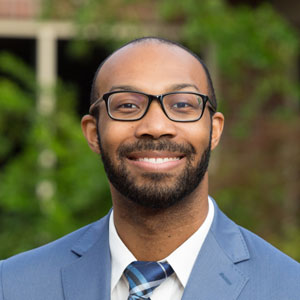
Welcome to the Fall 2020 semester! I want to start by introducing Mr. Joshua Morgan, Program Manager for Academic Integrity. He joined the Office of Faculty Development and Advancement this summer and we are delighted he has joined our team. His responsibilities include educational outreach as well as helping faculty navigate the Academic Honor Policy process. Please contact him at jlmorgan@fsu.edu if you would like him to share information with your students or faculty regarding academic integrity.
Since FSU has gone remote, this has been a banner year for academic integrity issues. In a 2015 survey, FSU students self-reported that they are 62-65% more likely to consult unauthorized material while taking an online exam. This is compared to 2% in a face-to-face setting.
While this list is not exhaustive, here are tips to help encourage your students to work with integrity:
- Emphasize on Day One and throughout the semester your expectations regarding academic integrity. Expectations should be outlined clearly in writing in your course syllabus and verbal communications with your students. Your approach to academic integrity on the first day of the semester sets the tone – make it count.
- Tell students to treat online quizzes or exams as if they were taking it in a face-to-face format. Use Honorlock or other appropriate proctor when administering exams. If possible, randomize your questions and do not extend the testing window for any longer than necessary. Consider giving assessments that are opinion-based and subjective and have a "scaffolding" element.
- No talking should be allowed (even to themselves) and no one else should be in the room. Have them practice doing a full and through 360-degree room scan. If they have problems during the exam (internet connection, someone walks in unexpectedly), they should contact you immediately following the exam so it does not get flagged for suspicious behavior. If students know before the exam starts that they may have issues, they should contact you before the exam starts.
- It is your responsibility to review Honorlock videos that been flagged "red" or "yellow" – contact this office if you have concerns about behavior that looks suspicious.
- Students will create a GroupMe for your class. It is the instructor's responsibility to make clear in writing (and verbally) what is considered group work vs. individual work. Students will use any and all technology to collaborate, especially in a remote environment.
- Be clear about what materials are authorized while taking Honorlock exams (calculators, scratch paper, etc.) We suggest you remind them frequently in writing and verbally.
- Let your students know that they can come to you if they are have difficulties! These are tough times! Be approachable and have fun!
We highly recommend the Office of Distance Learning's "Remote Proctoring for High-Stakes Assessments" workshop to enhance your familiarity with Canvas' and Honorlock's academic integrity functions.
Additionally, please consider using these academic integrity infographics in your Canvas courses:
Fall 2020 New Degree
Master of Science in Entrepreneurship
The Jim Moran College of Entrepreneurship (JMC) and the Dedman School of Hospitality (DSH) have opened their doors wide to students who want to obtain a master's degree. The MS in Entrepreneurship is a collaborative effort that has two distinct majors: Product Development in JMC and Hospitality Entrepreneurship in DSH.
The face-to-face major in Product Development provides opportunities for students to develop knowledge and skills in prototyping, product design, and development. Hands-on experience will build students' confidence and ability to innovate in their chosen field within corporate, professional, or government entities.
The online Hospitality Entrepreneurship major prepares students to start their own hospitality ventures or to join an established company, applying the leadership skills and innovative thinking practices they develop within the program.
The FSU Faculty Community
A Word from the Faculty Senate President
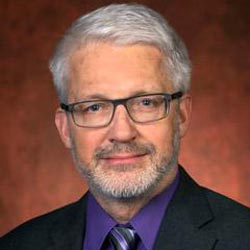
Welcome back to a new academic year at FSU. The majority of faculty are teaching remotely, the campus looks deserted most of the time, students won't be returning to campus after Thanksgiving break. Not your usual fall semester.
However, our education mission continues despite the hurdles imposed by covid-19. We've become proficient at remote delivery of courses and remote advising (with much assistance from the Center for the Advancement of Teaching and the Office of Distance Learning). Our department, college, and committee meetings are regularly held online rather than in-person. Conferences and seminars are remote. All of this, of course, is to keep ourselves, our students, and the university community safe and healthy. Please stay aware of, and adhere to, the measures FSU has instituted to reduce the spread of covid-19.
My thanks to all the faculty who volunteered through the spring service survey to work on one or more of the senate's standing committees. These committees have a total of over 150 seats with about 60 each year becoming vacant. We filled these positions over the summer and welcome all the new and returning faculty to these committees. If you did not get called to serve on a committee, there could be several reasons for this: we tend not to pick very junior faculty for this level of service work, some seats are specific to faculty from particular colleges, and sometimes there are dozens of volunteers for a single committee. If you did not get selected this year, I encourage you to continue to volunteer for these committee positions in the future.
The next faculty senate meeting will be on Zoom on October 21 at 3:35pm.
All senate meetings are open to the public. You can find information on how to join at the senate webpage.
Eric Chicken
Faculty Senate President
Stay in Touch
Follow us on social media to see what your colleagues are up to. Hint: following us on Instagram helps keep you connected to information going to students from faculty and about faculty. Have a message for students? Let us get it on Instagram for you!

